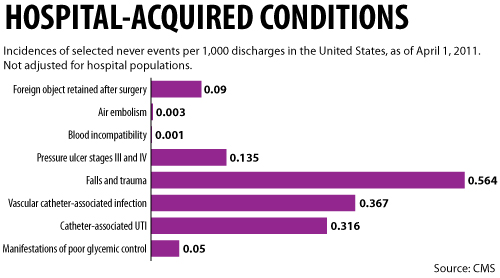The National Quality Forum (NQF), an advocacy group focused on developing a national strategy for healthcare quality measurement, identified 28 adverse events in 2002 now commonly referred to as “never events.” Such events are considered preventable and as such should never occur in any healthcare setting. Some examples of never events are decubitus, urinary tract infections, central line infections, wrong site surgery, medication errors, and suicide.
In an effort to decrease Medicare and Medicaid spending, the Centers for Medicare and Medicaid Services (CMS) have since adopted a modified list of never events. The Centers for Medicare and Medicaid Services (CMS) announced in August 2007 that Medicare would no longer pay for additional costs associated with many preventable errors, including those considered Never Events. Since then, many states and private insurers have adopted similar policies. Since February 2009, CMS has not paid for any costs associated with wrong-site surgeries. Never Events are also publicly reported, with the goal of increasing accountability and improving the quality of care.
When the Centers for Medicare & Medicaid Services (CMS) initiated its project on “never events,” the concept of increased liability for providers was not a consideration. The project was simply a way to increase patient safety in the healthcare setting and to curb costs. But now the concern is that the strict liability in regards to payment may translate into strict liability for the healthcare worker. If a condition is not going to be reimbursed due to liability then also one can say that there was liability involved for the condition to exist.
JOHNS HOPKINS MALPRACTICE STUDY: SURGICAL ‘NEVER EVENTS’ OCCUR AT LEAST 4,000 TIMES PER YEAR
CMS list of nonreimbursable hospital-acquired conditions
1. Object inadvertently left in after surgery
2. Air embolism
3. Incompatible blood transfusion
4. Catheter-associated urinary tract infection
5. Decubitus ulcer
6. Vascular catheter-associated infection
7. Mediastinitis after coronary artery bypass graft
8. Certain types of falls and trauma
9. Surgical site infections after bariatric and certain orthopaedic procedures
10. Legionnaire’s disease
11. Manifestations of poor glycemic control
12. Iatrogenic pneumothorax
13. Delirium
14. Ventilator-associated pneumonia
15. Deep venous thrombosis/pulmonary embolism
16. Staphylococcus aureus septicemia
17. Clostridium difficile infection
What are your thoughts regarding “Never Events” and provider liability? Have you seen this play out in any litigation? Comments/thoughts are welcome.
Leave a Comment